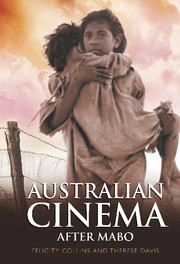Book contents
- Frontmatter
- Contents
- Acknowledgments
- Part 1 Australian Cinema and the History Wars
- Part 2 Landscape and Belonging after Mabo
- 5 Aftershock and the Desert Landscape in Heaven's Burning, The Last Days of Chez Nous, Holy Smoke, Serenades, Yolngu Boy, The Missing
- 6 Coming from the Country in Heartland, Cunnamulla and Message from Moree
- 7 Coming from the City in The Castle, Vacant Possession, Strange Planet and Radiance
- Part 3 Trauma, Grief and Coming of Age
- Bibliography
- Index
6 - Coming from the Country in Heartland, Cunnamulla and Message from Moree
Published online by Cambridge University Press: 31 January 2011
- Frontmatter
- Contents
- Acknowledgments
- Part 1 Australian Cinema and the History Wars
- Part 2 Landscape and Belonging after Mabo
- 5 Aftershock and the Desert Landscape in Heaven's Burning, The Last Days of Chez Nous, Holy Smoke, Serenades, Yolngu Boy, The Missing
- 6 Coming from the Country in Heartland, Cunnamulla and Message from Moree
- 7 Coming from the City in The Castle, Vacant Possession, Strange Planet and Radiance
- Part 3 Trauma, Grief and Coming of Age
- Bibliography
- Index
Summary
At the end of The Tracker (Rolf de Heer, 2002) David Gulpilil's character, mimicking the lone hero of the Western, rides off into the far distance towards the horizon, leaving behind the young follower who will make his own way back to civilisation, a more civilised man after his enlightening encounter with the violence of the frontier between two laws. In this sense The Tracker re-imagines the frontier violence of the colonial encounter by suggesting, through the figure of The Follower, that there is an alternative national history to the ‘self-innocenting narrative casting our national forebears as caring, Christian civilisers motivated by concern for the hapless natives’. Two things matter here. The first is what will happen afterwards, after the return to civilisation, after the end of the frontier wars. The second is how these events, these violent conflicts on the frontier between two laws, will be understood afterwards, how they will be translated by the surviving generations of both sides of the conflict who will, at some point, face each other in the post-colonial context of the nation. The key claim here is that founding colonial or ‘frontier’ conflict lives on, afterwards in the nation's actions and in subsequent translations of an unreconciled history between Aboriginal and settler Australians. Through Mabo, Wik and native title legislation, conflict over the meaning of an unreconciled national history (the history wars) has continued to be about land and its possession, about who is entitled to possess or repossess the land, and to name it, under what system of law.
- Type
- Chapter
- Information
- Australian Cinema After Mabo , pp. 94 - 111Publisher: Cambridge University PressPrint publication year: 2004



